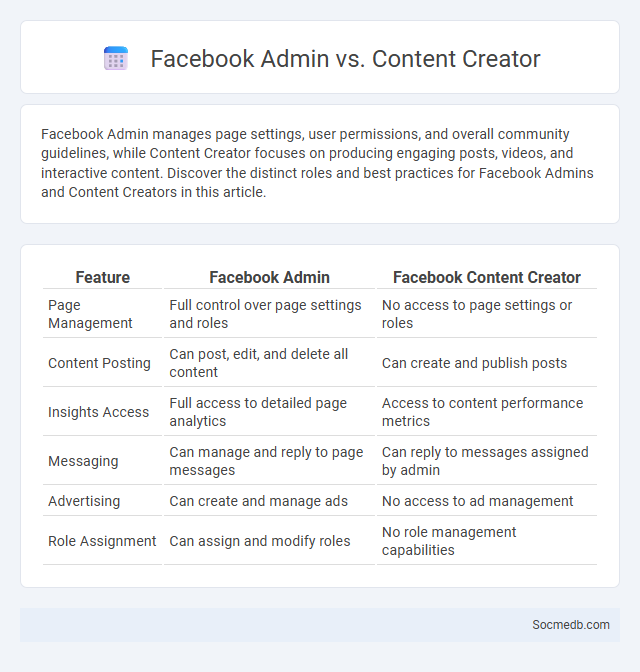
Photo illustration: Facebook Admin vs Content Creator
Facebook Admin manages page settings, user permissions, and overall community guidelines, while Content Creator focuses on producing engaging posts, videos, and interactive content. Discover the distinct roles and best practices for Facebook Admins and Content Creators in this article.
Table of Comparison
| Feature | Facebook Admin | Facebook Content Creator |
|---|---|---|
| Page Management | Full control over page settings and roles | No access to page settings or roles |
| Content Posting | Can post, edit, and delete all content | Can create and publish posts |
| Insights Access | Full access to detailed page analytics | Access to content performance metrics |
| Messaging | Can manage and reply to page messages | Can reply to messages assigned by admin |
| Advertising | Can create and manage ads | No access to ad management |
| Role Assignment | Can assign and modify roles | No role management capabilities |
Introduction to Facebook Roles: Admin vs Content Creator
Facebook Roles distinguish between Admins, who manage page settings, user permissions, and overall page strategy, and Content Creators, who focus on producing and publishing posts, engaging with the audience through comments, and analyzing content performance. Your ability to assign these roles ensures effective collaboration and streamlined management, maximizing your page's impact. Understanding the responsibilities and limitations of each role improves both security and productivity on your Facebook page.
Understanding the Facebook Admin Role
The Facebook Admin role grants you full control over a Page, allowing you to manage settings, post content, and respond to comments. You can add or remove other admins, monitor insights, and ensure the Page aligns with your brand's goals. Understanding these permissions helps you maintain security and optimize engagement on your Facebook presence.
Responsibilities of a Facebook Content Creator
Facebook content creators must consistently produce engaging, relevant posts that align with the platform's community guidelines and brand voice. They are responsible for monitoring audience interactions, responding to comments, and fostering a positive online environment. Analyzing performance metrics and adapting content strategies based on data insights are crucial to maximizing reach and engagement on Facebook.
Key Differences Between Admin and Content Creator
Social media admins manage account settings, user permissions, and overall platform security, ensuring smooth operation and compliance with policies. Content creators generate engaging posts, videos, and graphics designed to attract and retain followers while driving brand awareness. Admins have control over account analytics and content scheduling, whereas creators focus primarily on content ideation and quality.
Permissions: What Facebook Admins Can Do
Facebook admins have extensive permissions that include managing page roles, moderating comments, and controlling content visibility to ensure community guidelines are followed. They can create and schedule posts, respond to messages, and access detailed insights and analytics to optimize engagement. Admins also have the authority to remove harmful content, ban users, and configure page settings to maintain a safe and professional online environment.
Content Creator Limitations on Facebook Pages
Facebook Pages impose content creator limitations such as restrictive post formats, algorithm-driven visibility constraints, and stringent community standards that can hinder organic reach and engagement. Page admins often face challenges with reduced content distribution due to Facebook's prioritization of personal profiles over Pages in the news feed. Copyright policies and frequent updates to Facebook's content guidelines further limit the scope and freedom for creators to publish diverse and monetizable content.
Collaboration: Admins and Content Creators Working Together
Admins and content creators collaborate closely to enhance social media engagement and brand consistency. You can streamline content approval processes by using shared platforms and clear communication channels, ensuring timely and high-quality posts. This teamwork drives audience growth and strengthens your online presence effectively.
Choosing the Right Role for Your Facebook Page
Selecting the appropriate role for your Facebook page is crucial for effective management and security. Assign roles such as Admin, Editor, Moderator, Advertiser, or Analyst based on team member responsibilities and access needs. Proper role assignment ensures streamlined content control, targeted ad management, and efficient community interaction on your Facebook business page.
Impact on Page Management and Security
Effective social media strategies enhance page management by streamlining content scheduling, audience engagement, and performance analytics, ensuring consistent brand messaging. Robust security protocols protect your social media accounts from cyber threats such as hacking, phishing, and unauthorized access, safeguarding sensitive data and maintaining user trust. You must implement strong passwords, two-factor authentication, and regular monitoring to uphold the integrity and safety of your social media presence.
Conclusion: Selecting the Optimal Facebook Role
Selecting the optimal Facebook role depends on your specific needs, whether managing a page, advertising, or analyzing data. Each role, from Admin to Analyst, offers distinct permissions that balance control and security for your social media presence. Your choice ensures efficient management and safeguards your Facebook assets effectively.
 socmedb.com
socmedb.com